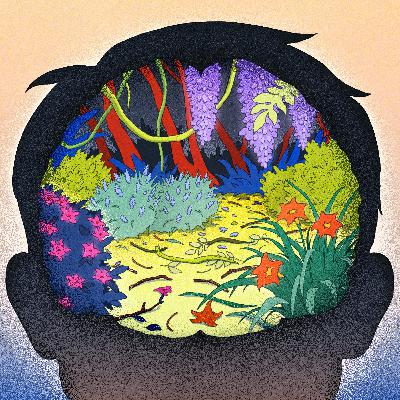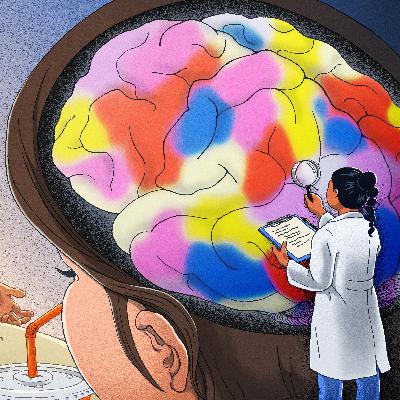Discover Unexplainable
Unexplainable

Unexplainable
Author: Vox
Subscribed: 16,171Played: 551,549Subscribe
Share
© 2021 Vox Media, Inc. All Rights Reserved
Description
Unexplainable takes listeners right up to the edge of what we know…and then keeps on going. The Unexplainable team — Noam Hassenfeld, Julia Longoria, Byrd Pinkerton, and Meradith Hoddinott — tackles scientific mysteries, unanswered questions, and everything we learn diving into the unknown. New episodes Mondays and Wednesdays.
From Vox and the Vox Media Podcast Network.
264 Episodes
Reverse
How many fish are in the sea? It's a question that has had enormous consequences for the fishing community in New Bedford, Massachusetts. But one man managed to find a way around it. That man? The Codfather.
Guest: Ian Coss, host and producer of WBGH's Catching the Codfather
For show transcripts, go to vox.com/unxtranscripts
For more, go to vox.com/unexplainable
And please email us! unexplainable@vox.com
We read every email.
Support Unexplainable (and get ad-free episodes) by becoming a Vox Member today: vox.com/members
Thank you!
Learn more about your ad choices. Visit podcastchoices.com/adchoices
It's no secret that stress isn't good for you… But just how bad is it? NPR's Short Wave podcast gets some answers.
Host: Regina G. Barber, host of NPR’s Short Wave podcast
Guest: Diana Kwon, science journalist
Follow NPR's Short Wave podcast on Apple Podcasts and Spotify for more episodes like this, featuring new discoveries, everyday mysteries and the science behind the headlines.
Listen to every episode of Short Wave sponsor-free and support our work at NPR by signing up for Short Wave+ at plus.npr.org/shortwave.
For show transcripts, go to vox.com/unxtranscripts
For more, go to vox.com/unexplainable
And please email us! unexplainable@vox.com
We read every email.
Support Unexplainable (and get ad-free episodes) by becoming a Vox Member today: vox.com/members
Thank you!
Learn more about your ad choices. Visit podcastchoices.com/adchoices
In the dark depths of the Gowanus Canal, strange lifeforms lurk...
Guests: Brad Vogel, volunteer at the Gowanus Dredgers Canoe Club; Elizabeth Hénaff, computational biologist and artist at New York University
For more, go to http://vox.com/unexplainable
It’s a great place to sign up for our newsletter, view show transcripts, and read more about the topics on our show.
Also, email us! unexplainable@vox.com
We read every email.
Support Unexplainable by making a financial contribution to Vox! bit.ly/givepodcasts
Learn more about your ad choices. Visit podcastchoices.com/adchoices
Learn more about your ad choices. Visit podcastchoices.com/adchoices
I’m about to burst.
Guests: Laryngologist Dr. Robert Bastian and Noel King, co-host and editorial director of the Vox daily news podcast Today, Explained
For more, go to http://vox.com/unexplainable
It’s a great place to sign up for our newsletter, view show transcripts, and read more about the topics on our show.
Also, email us! unexplainable@vox.com
We read every email.
Support Unexplainable by making a financial contribution to Vox! bit.ly/givepodcasts
Learn more about your ad choices. Visit podcastchoices.com/adchoices
Learn more about your ad choices. Visit podcastchoices.com/adchoices
Astronomers are putting together a new picture of the early universe. It involves a lot of very weird black holes, and it could help us understand how our own galaxy formed.
Guest: Caitlin Casey, astronomer at UC Santa Barbara
For show transcripts, go to vox.com/unxtranscripts
For more, go to vox.com/unexplainable
And please email us! unexplainable@vox.com
We read every email.
Support Unexplainable (and get ad-free episodes) by becoming a Vox Member today: vox.com/members
Thank you!
Learn more about your ad choices. Visit podcastchoices.com/adchoices
It’s surprisingly hard to predict how clouds form, move, and change, but it’s essential to try. Because how clouds react to a warming world helps determine how hot our future will be.
Guests: Vox contributor Umair Irfan, scientists Scott M. Collis, Angeline Pendergrass, and author Gavin Pretor-Pinney
For show transcripts, go to vox.com/unxtranscripts
For more, go to vox.com/unexplainable
And please email us! unexplainable@vox.com
We read every email.
Support Unexplainable (and get ad-free episodes) by becoming a Vox Member today: vox.com/members
Thank you!
Learn more about your ad choices. Visit podcastchoices.com/adchoices
Every hand-crafted instrument from violin maker Michael Doran holds its own unexplainable questions.
Guest: Michael Doran of Doran’s Violin’s
For show transcripts, go to vox.com/unxtranscripts
For more, go to vox.com/unexplainable
And please email us! unexplainable@vox.com
We read every email.
Support Unexplainable (and get ad-free episodes) by becoming a Vox Member today: vox.com/members
Thank you!
Learn more about your ad choices. Visit podcastchoices.com/adchoices
There's been a real rollback of one of the US government's most fundamental tasks: gathering data. Vox correspondents Dylan Scott and Umair Irfan take a look at what a future with less data means for climate and health care in the US.
Guests: Vox correspondent Umair Irfan and Vox senior correspondent Dylan Scott
For show transcripts, go to vox.com/unxtranscripts
For more, go to vox.com/unexplainable
And please email us! unexplainable@vox.com
We read every email.
Support Unexplainable (and get ad-free episodes) by becoming a Vox Member today: vox.com/members
Thank you!
Learn more about your ad choices. Visit podcastchoices.com/adchoices
Things in the news have been feeling kind of…bleak, so we called in some reinforcements. Vox's senior editorial director and resident good news expert Bryan Walsh joins editor Joanna Solotaroff to remind us that there’s still a lot of good stuff happening, too.
Guest: Vox senior editorial director Bryan Walsh. Sign up for the Good News newsletter HERE.
For show transcripts, go to vox.com/unxtranscripts
For more, go to vox.com/unexplainable
And please email us! unexplainable@vox.com
We read every email.
Support Unexplainable (and get ad-free episodes) by becoming a Vox Member today: vox.com/members
Thank you!
Learn more about your ad choices. Visit podcastchoices.com/adchoices
Parents are supposed to provide the best life possible for their kids, right? But what does that mean when genetic testing for the baby enters the picture? And how far should they go? Vox senior reporter Sigal Samuel received that ethically ambiguous question for her advice column Your Mileage May Vary from a parent-to-be, and in this episode walks Noam through her thinking using a philosophical framework.
For show transcripts, go to vox.com/unxtranscripts
For more, go to vox.com/unexplainable
And please email us! unexplainable@vox.com
We read every email.
Support Unexplainable (and get ad-free episodes) by becoming a Vox Member today: vox.com/members
Thank you!
Learn more about your ad choices. Visit podcastchoices.com/adchoices
Is geoengineering the answer to the climate crisis? Or is it too dangerous to even discuss? It’s been theoretical so far, but now, one startup says their technology could soon shield the Earth from the sun.
Guest: Robinson Meyer, climate journalist and founding executive editor of Heatmap News.
For show transcripts, go to vox.com/unxtranscripts
For more, go to vox.com/unexplainable
And please email us! unexplainable@vox.com
We read every email.
Support Unexplainable (and get ad-free episodes) by becoming a Vox Member today: vox.com/members
Thank you!
Learn more about your ad choices. Visit podcastchoices.com/adchoices
Yellowstone can be a deadly place... but not for the reasons you might think.
Guest: Mike Poland, scientist in charge at the Yellowstone Volcano Observatory
For show transcripts, go to vox.com/unxtranscripts
For more, go to vox.com/unexplainable
And please email us! unexplainable@vox.com.
We read every email
Support Unexplainable (and get ad-free episodes) by becoming a Vox Member today: vox.com/members
Thank you!
Learn more about your ad choices. Visit podcastchoices.com/adchoices
A two-time Nobel Prize-winning scientist changed chemistry, biology, and the politics of science. But when he pushed vitamin C as a cure-all, did he go too far?
Guest: Daniel M. Davis, head of the department of life sciences and professor of immunology at Imperial College London. He is the author of Self-Defense: A Myth-Busting Guide to Immune Health.
For show transcripts, go to vox.com/unxtranscripts
For more, go to vox.com/unexplainable
And please email us! unexplainable@vox.com
We read every email.
Support Unexplainable (and get ad-free episodes) by becoming a Vox Member today: vox.com/members
Thank you!
Learn more about your ad choices. Visit podcastchoices.com/adchoices
This episode is a follow-up to The Sound Barrier series, which explores our brain's relationship to sound. In our third episode of the series, we asked listeners to try to experience silence and record what they heard. Today, we share the sounds of quiet from across the world in a tribute to John Cage’s 4’33”. Plus, Tinnitus researcher and Unexplainable guest Dan Polley answers your questions from the series.
Guest: Dan Polley, tinnitus researcher at Mass Eye and Ear.
Thank you to everyone who wrote in and shared their silences. If you still have thoughts or questions about the series, write us!
We also heard from a few teachers who plan to use the series as a part of their curriculum. Is this you? Let us know!
For show transcripts, go to vox.com/unxtranscripts
For more, go to vox.com/unexplainable
And please email us! unexplainable@vox.com. We read every email.
Support Unexplainable (and get ad-free episodes) by becoming a Vox Member today: vox.com/members
Thank you!
Learn more about your ad choices. Visit podcastchoices.com/adchoices
As our brains develop throughout our childhood and teens, they form connections and then prune back the ones that aren't used. What can we learn from them?
Guests: Alison Barth, professor in the life sciences at Carnegie Mellon University; Saket Navlakha, associate professor at Cold Spring Harbor Laboratory
This series was made possible by support from the Annie E. Casey Foundation. Vox had full discretion over the content of this reporting.
For show transcripts, go to vox.com/unxtranscripts
For more, go to vox.com/unexplainable
And please email us! unexplainable@vox.com
We read every email.
Support Unexplainable (and get ad-free episodes) by becoming a Vox Member today: vox.com/members
Thank you!
Learn more about your ad choices. Visit podcastchoices.com/adchoices
What's going on in teens' heads? Scientists working on a country-wide study following thousands of young people have spent the last decade trying to answer that question.
Guests: Raul Gonzalez Jr., psychology professor at Florida International University
This series was made possible by support from the Annie E. Casey Foundation. Vox had full discretion over the content of this reporting.
For show transcripts, go to vox.com/unxtranscripts
For more, go to vox.com/unexplainable
And please email us! unexplainable@vox.com
We read every email.
Support Unexplainable (and get ad-free episodes) by becoming a Vox Member today: vox.com/members
Thank you!
Learn more about your ad choices. Visit podcastchoices.com/adchoices
Way back when forests first evolved on Earth... they might have triggered one of the biggest mass extinctions in the history of the planet. (Originally aired in 2024)
Guests: Charles Ver Straeten, curator of sedimentary rocks at the New York State Museum; Lisa Amati, curator of invertebrate paleontology at the New York State Museum; Thomas Algeo, professor of geochemistry at the University of Cincinnati
For show transcripts, go to vox.com/unxtranscripts
For more, go to vox.com/unexplainable
And please email us! unexplainable@vox.com
We read every email.
Support Unexplainable (and get ad-free episodes) by becoming a Vox Member today: vox.com/members
Thank you!
Learn more about your ad choices. Visit podcastchoices.com/adchoices
It's a quasi-moon. Or, a quasi-satellite. Whatever you want to call it, it's hanging out near Earth. And it could be the source of some fascinating new science.
Guests: Nick Moskovitz, astronomer at Lowell Observatory
For show transcripts, go to vox.com/unxtranscripts
For more, go to vox.com/unexplainable
And please email us! unexplainable@vox.com
We read every email.
Support Unexplainable (and get ad-free episodes) by becoming a Vox Member today: vox.com/members
Thank you!
Learn more about your ad choices. Visit podcastchoices.com/adchoices
So many of us have been told that meditation can make us less stressed, more productive, and happier. But for a small group of people, it has a dark side. What’s going on?
Guests: Willoughby Britton, associate professor at Brown University; Richard Davidson, professor at the University of Wisconsin-Madison; Pierce Salguero, professor at the Abington College of Pennsylvania State University
This episode was made in partnership with Vox’s Future Perfect team.
For show transcripts, go to vox.com/unxtranscripts
For more, go to vox.com/unexplainable
And please email us! unexplainable@vox.com
We read every email.
Support Unexplainable (and get ad-free episodes) by becoming a Vox Member today: vox.com/members
Thank you!
Learn more about your ad choices. Visit podcastchoices.com/adchoices
A dog on its owner’s grave. A killer whale carrying around its dead calf. A goose that isolates when its mate dies. These behaviors in animals may look like human mourning, but should scientists call them "grief"? (First published in 2023)
Guests: Jennifer Vonk, comparative/cognitive psychologist at Oakland University; Jessica Pierce, bioethicist and author of several books about animals; Susana Monsó, animal ethicist and a philosopher and author of Playing Possum: How Animals Understand Death
For show transcripts, go to vox.com/unxtranscripts
For more, go to vox.com/unexplainable
And please email us! unexplainable@vox.com
We read every email.
Support Unexplainable (and get ad-free episodes) by becoming a Vox Member today: vox.com/members
Thank you!
Learn more about your ad choices. Visit podcastchoices.com/adchoices








💨
🤓
This is just the audio file for Part 1 relabeled Part 2.
Michael Jordan no matter what benefits he got or didn't was head and shoulders above all, I would put probably Hakeem Olajuwon 2nd in all around greatness stat wise, just watch Jordan s films ,half man ,half alien, an athlete that got all the good genes , more perfectly built than probably any human ever past or present, 6'6" 200 pounds 3 % body fat, extreme wingspan, 4.3 40 yard speed, 45 inch vertical, unmatched ball handling coordination, great vision peripheral,
those stats are always way different on road they gave home teams more foul calls beneficial wise plus lots of corruption in NBA ,mafia, refs were under the thumbs in many cities, players at home got away with blocks even when not clean in most games on road they weren't given as much slack on players away games
🛸
🌊
Sometimes ignorance is bliss. 🤢
🤯
🤖
this is fascinating. i want to listen to it a few times to really absorb everything. excellent work.
Wow, the concept that our bodies twitch in sleep to maintain the nerve connections to our brains is cool, although I still want to believe my dogs are chasing squirrels in their dreams. 🐕
Really cool that placebos have therapeutic value in their own right. If it makes people feel better and doesn't actively harm, that's great!
The second time in 2 days I've heard so much excitement about phages. I'm intrigued to see if this intervention develops more staying power. We need alternatives to antibiotics now that we're seeing the downstream effects.
I love Unexplainable, but I don't love this shared podcast episode. Couldn't finish it. I expected a few alpha jokes given the content, but hearing this story from what sounds like a bunch of bros is making my eyes hurt from rolling so hard. Ugh
ugh Such a frustrating episode. I know it's unexplainable, but damn. Hopefully more funding will find this topic soon.
Is anyone else having trouble with the constant ding sounds? I was actually relieved when they went to commercial
would love to see one on the Bootes Void!
Oof yeah that's quite the conundrum: Do we clean up the plastic that's become a habitat for different species?
🤯 This is wild! ... and freaky